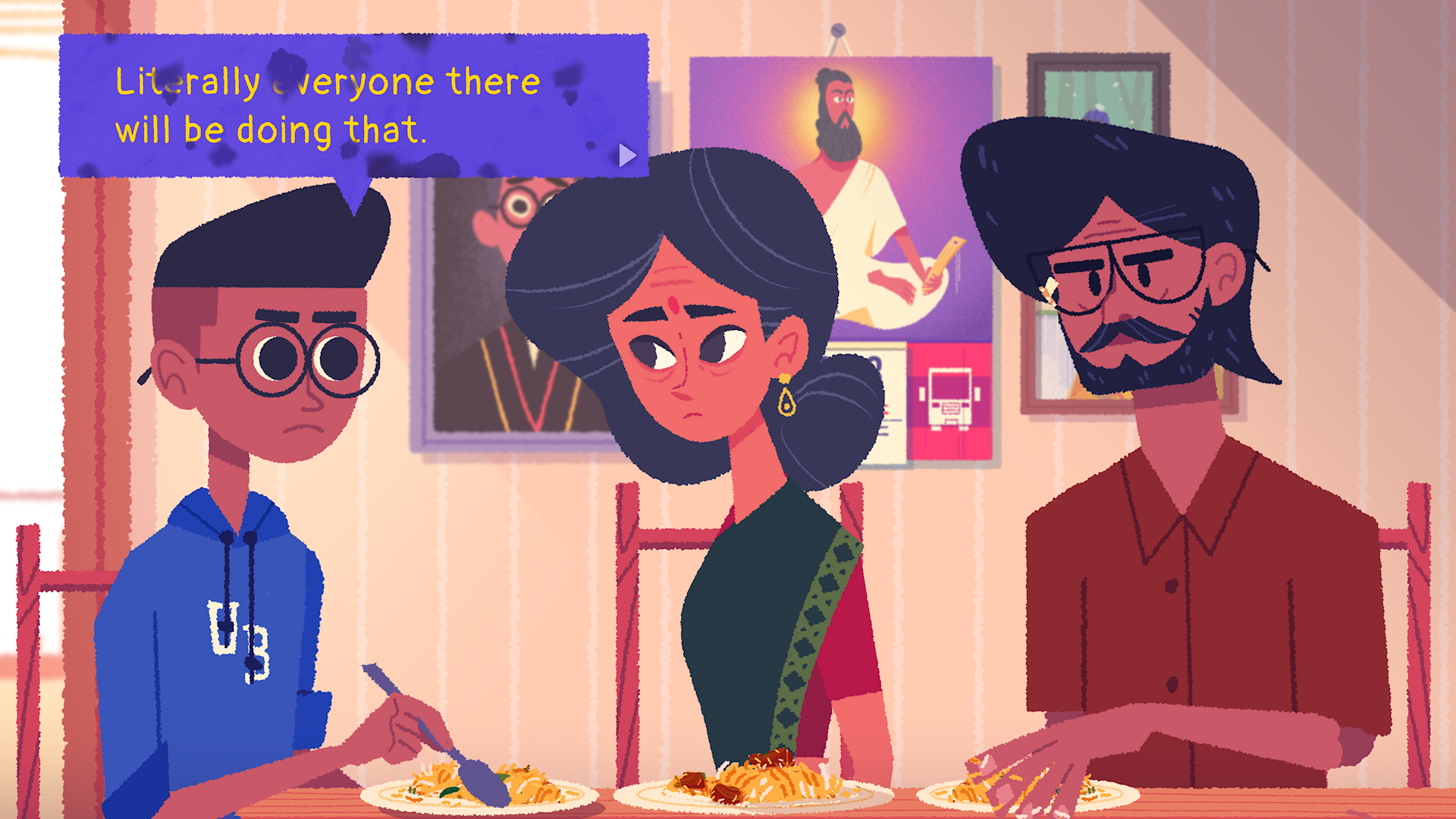The Venba bus is coming!
Venba is an interesting game to review. It skirts the line between a virtual novel and cooking game without really committing too heavily to either. In spite of that I found myself really enjoying it and finding the experience really quite memorable without being fully clear as to what it was I particularly liked. But like it I did, and the small team at Visai Games should be proud of what they have made.
The focus of Venba is an Indian family that emigrated to Canada during the 80s, leaving behind their previous life, and to an extent their culture. Finding their new life a struggle, Venba and Paavalan consider moving back, when they find that Venba is pregnant and they decide to lay down roots in their new home. Over the 90-or-so minutes of the game, issues of old vs. new culture come up. Their son Kavin grows up in a different world to the one in which Venba and Paavalan did, and they use their family’s historical recipes to maintain links to their previous life, as well as pass on elements of that culture to the next generation.

This is in part, a tale of the struggles of families who emigrate and find their new homes perhaps not as welcoming as they would hope, which I feel is an important narrative these days. But Venba doesn’t dwell on this, instead being more interested in focusing on how first-generation and second-generation immigrants see their home countries in different ways, and how the older generation has historical links that the younger may not recognise.
Whilst the narrative is told through discussions between the family members, in which you can make the occasional conversational choice, there’s also a lot of visual storytelling going on here. Venba reminded me of Unpacking in this way, as certain items in the home tell part of the tale, and how the environment around them changes tells us what has happened in the previous years without the need for explicit dialogue. Venba’s blanket at the start has a small aeroplane logo on it, implying it’s one taken from their flight over, the background shelves filling over time, and speech bubbles spoken in English rather than Tamil appearing scruffy and hard to read as the family struggle to keep up with a language that isn’t native to them. It’s all wonderfully done, and rewards players paying attention to what’s happening beyond simply the text.

At various points in the story, Venba will need to cook for the family, and this is where the actual gameplay comes in. She uses her mother’s old cookbook, which is damaged with age, to prepare old family recipes, and your job is to do them in the right order. The damage to the book adds the challenge here, as not everything is always fully clear, but there’s always enough information to get things right the first time. You’ll generally need to add ingredients to a pan in the correct order, but some recipes have additional features to add some complexity.
There’s no penalty for getting things wrong though, and you can simply retry with no loss beyond the five minutes you may have spent so far. They’re satisfying to get right, and I think the difficulty was pitched just right. What’s interesting is that the cooking sections actually get easier towards the end of the game, as Venba becomes more and more used to cooking these recipes to the point that it’s second nature. It’s another nice narrative touch that isn’t explicit that I particularly enjoyed.
Late in the game, more focus is placed on the son Kavin, and how he’s trying to balance his Indian heritage with the Canadian life he knows. There are some interesting points here that I won’t spoil, but ultimately he tries to learn to cook his family’s old recipes too. His inexperience makes this harder for him, which returns challenge to the cooking puzzles, and once again you find yourself having to work through an unclear recipe book that gives you just enough to solve the puzzle without too many failures. It led to a satisfying conclusion that rounded out the story well.

The visuals in Venba are simple but well done. The use of colour is particularly effective for denoting the current mood in the household, and although the animation isn’t the style I personally enjoy, it meant that all the emotions were well conveyed in simple ways. The music though, was excellent. It landed just right, and the moments where Venba would turn on the radio as she was about to cook would result in another fitting, and I assume authentic, piece for your next puzzle. Sound effects were equally high level. Sizzling oil, clanking utensils, and hissing steam all come across strongly and feel as though they fit in this colourful world. There’s no voice acting, and initially, I was disappointed in this, but over time I think it made sense as it allowed the speech bubbles to clearly denote what language was being spoken and when Venba and Paavalan were struggling to understand.
Venba is an excellent, albeit short, experience that tells a story that I haven’t seen before. That uniqueness alone should be celebrated, but the fact that the game is so well put together is a testament to the development team setting out with a vision and executing it perfectly. Whilst there are secrets here, I don’t think they are necessarily worth seeking out, so the only real issue I might have is that this is a short, one-and-done experience. Not that I mind though, as I’d certainly prefer a tight, well-made, sub-two-hour experience over a twenty-hour slog, so even the length gets a tick in my recipe book.
Venba is available now on PC, Xbox, Playstation, and Nintendo Switch.
Comments are closed.